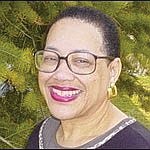Justice, equality and freedom are elusive, by Charlene Crowell
9/24/2020, 6 p.m.
The Aug. 23 police shooting of an unarmed Black man in Kenosha, Wis., triggered yet another round of community protests and national news coverage.
Multiple gunshots fired by a local police officer were not fatal for 29-year old Jacob Blake, but may have permanently paralyzed him from the waist down.
Days later on Aug. 28, the National Action Network was a major organizer for a Commitment March, re-dedicating the yet unaddressed dreams of the historic 1963 March on Washington. Assembled again at Washington’s Lincoln Memorial, the day’s speakers included the Rev. Al Sharpton, Martin Luther King III and fam- ily members of Mr. Blake, George Floyd and Breonna Taylor.
Despite the passage of nearly 60 years between the original march and its 2020 recommitment, many of the issues that plagued Black America then remain the same. Black America and other people of color still cry for justice, equality and freedom.
Why measurable forward strides in policing or economic progress have remained elusive after decades of calls for reforms may partly be explained by the findings of a new policy analysis by the U.S. Federal Reserve Bank in St. Louis. Using U.S. Census Bureau data, Ana Hernandez Kent, a policy analyst
with the St. Louis Federal Reserve, found that America’s racial poverty gap continues to suppress social and economic justice. Moreover, Wisconsin — and not a Southern state—claims the dubious distinction of having the largest poverty gap in the nation.
The analysis found that in 2018, Black households nationally earned 61 cents for every $1 of white household median income. Further, the Black-white median household income gaps ranged from 87 cents per dollar in Maine and Hawaii to 32 cents per dollar in the District of Columbia. The disparity in median translates into 22 percent of all Black Americans living in poverty, a gap of 13 percent compared to whites who are poor. Wisconsin’s gap is 23 percent.
“In noting the socioeconomic indicators of median income, poverty rates and health insurance rates, I found that white people had more favorable outcomes than Black people in every state,” wrote Ms. Hernandez Kent.
Poverty’s racial disparity extends to other key measures such as median incomes, homeownership and retirement.
Even with the enactment of the Fair Housing Act more than 50 years ago, today’s Black homeownership rate is dwindling. According to Ohio State University Professor Trevon Logan, “The homeownership gap between Blacks and whites is higher today in percentage terms than it was in 1900.”
Nikitra Bailey of the Center for Responsible Lending recently told ABC News that the suburbs “intentionally created opportunities for white families while holding back opportunities for families of color. ...What we are really talking about is opportunity in our nation.”
With escalating violence in a growing number of cities occurring just months before an election, everyday citizens and scholars are echoing community and national leaders on the connection between key policies like housing segregation to violent eruptions.
Last December, the Journal of the National Medical Association, the professional organization of Black physicians, published an article entitled, “The Relationship between Racial Residential Segregation and Black-White Disparities in Fatal Police Shootings at the City Level, 2013–2017.”
The authors concluded that “Racial residential segregation is a significant predictor of the magnitude of the Black-white disparity in fatal police shootings at the city level. Efforts to ameliorate the problem of fatal police violence must move beyond the individual level and consider the interaction between law enforcement officers and the neighborhoods that they police.”
Before the thousands gathered at the re-commitment march in Washington in August, Rev. Sharpton also spoke to this same concern.
“It’s time we have a conversation with America. We need to have a conversation about your racism, about your bigotry, about your hate, about how you would put your knee on our neck while we cry for our lives. We need a new conversation. ...You act like it’s no trouble to shoot us in the back. You act like it’s no trouble to put a choke hold on us while we scream, ‘I can’t breathe,’ 11 times. You act like it’s no trouble to hold a man down on the ground until you squeeze the life out of him.
“Our vote is dipped in blood,” Rev. Sharpton continued. “Our vote is dipped in those that went to their grave. We don’t care how long the line, we don’t care what you do, we’re going to vote, not for one candidate or the other, but we going to vote for a nation that’ll stop the George are loyds, that’ll stop the Breonna Taylors.”
The writer is a senior fellow with the Center for Responsible Lending.






